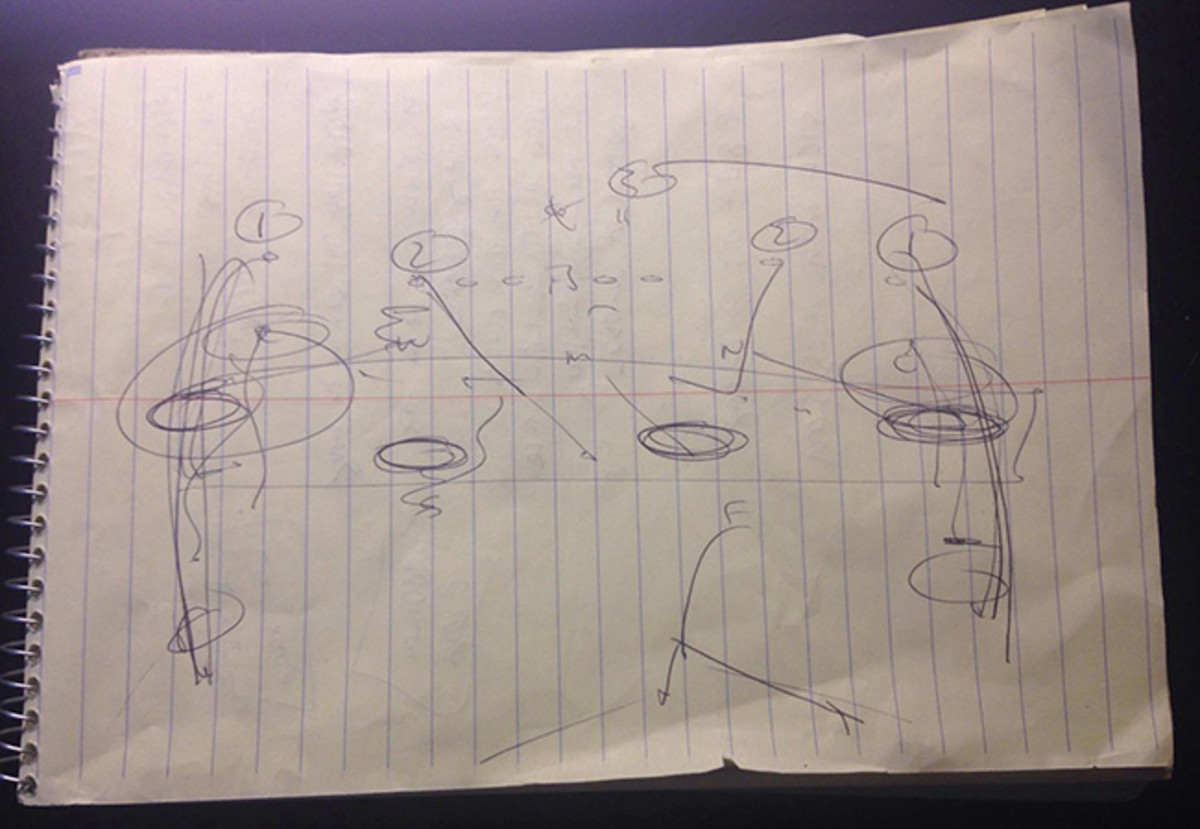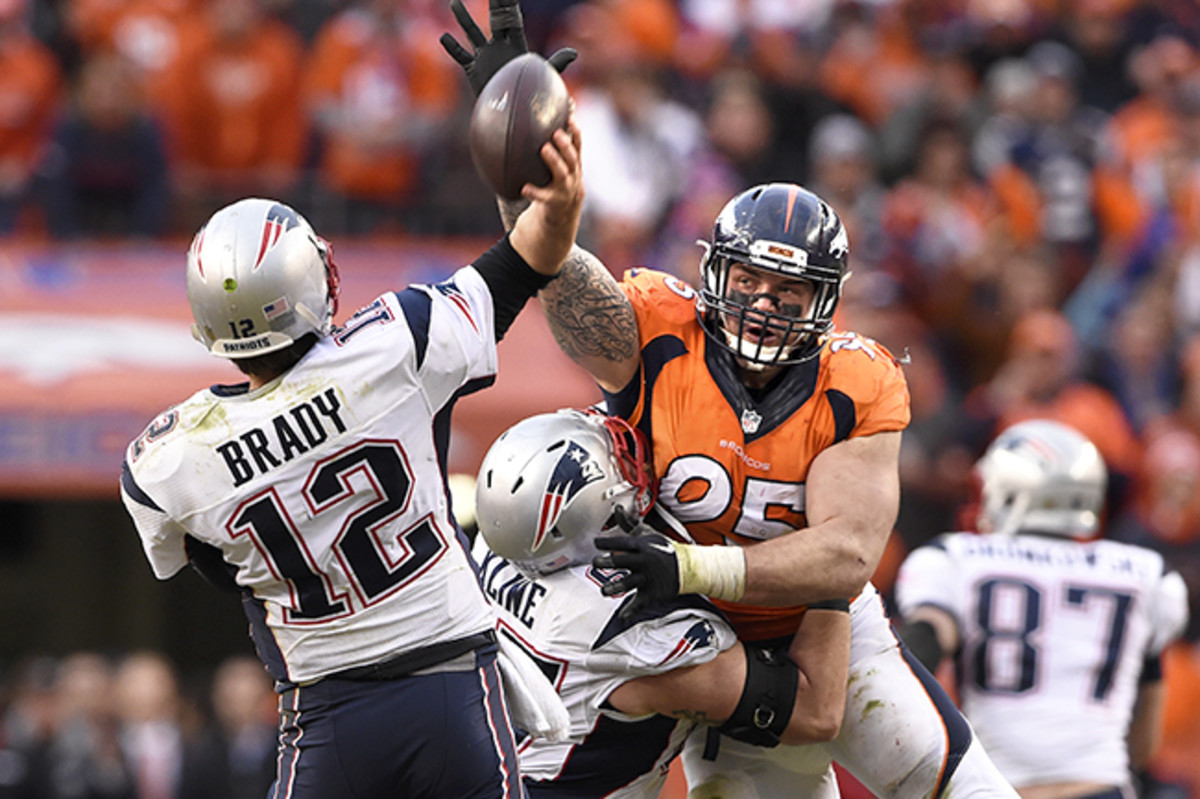Is This Cam’s Kryptonite?

SAN FRANCISCO — Dan Quinn wants to make this very clear: He doesn’t take pride in the Falcons’ Week 16 win over the Super Bowl-favored Carolina Panthers.
“Nope,” he says. “Honestly, nope. I don’t take pride in saying we are good enough to beat them once.”
Fair enough. But, beating Carolina once is more than anyone else in the NFL has done thus far this season. Quinn’s Falcons spoiled the Panthers’ bid for a perfect season, handing them a 20-13 loss in Atlanta that is the lone blemish on their 17-1 record. (He was also the defensive coordinator for the Seahawks team that eliminated the Panthers in the NFC Divisional Playoffs last year.) That makes him the only head coach in the league qualified to answer the million-dollar question going into Super Bowl 50: How can the 2015 Panthers be beat?
As a caveat, on the road and within the division can be the trickiest kind of game, because the opponents know each other so well. And in this case, the Falcons were just two weeks removed from a humiliating 38-0 loss to the Panthers in Charlotte. “In fairness, for the second game, we were really pissed,” Quinn says. “In my opinion, they had celebrated and laughed at us, and that happened on our watch, and we didn’t like that. I think that was a factor, too. Emotionally, we were ready to go.”
Regardless, the Falcons put on film a demo of how Cam Newton and the Panthers can be slowed and stopped. The Broncos, cornerback Aqib Talib assured, have watched and taken notes. And Quinn, with the assistance of a steno pad and pen, gave us a short tutorial while walking through the Super Bowl 50 Media Center Thursday morning with Falcons GM Thomas Dimitroff.
Atlanta’s success started where most winning defensive game plans start: By getting pressure on the quarterback. What’s interesting is not that they got pressure on Newton, it’s how they did it. Some teams are gun-shy about sending the heat against mobile quarterbacks like Newton, who can leak out of the pocket and burn you, but Quinn wasn’t deterred. They weren’t getting to the quarterback with just four rushers, so he regularly sent a five-man rush.
“Whether you are a mobile quarterback or not, Cam or Russ [Wilson] or guys who have the ability to create, you better still hit them,” Quinn says. “You can’t, in my opinion, play so vanilla, just push it and spy ’em. You’ve gotta still play aggressive because otherwise you’re not being true to what you do.”
All quarterbacks are affected by pressure, but as Pro Football Focus’ Neil Hornsby broke down for The MMQB, Newton’s production drops off markedly. He ranks third in the league in passer rating on dropbacks where he has a clean pocket. When he’s pressured, he slides to the 19th-ranked passer, with his passer rating dropping more than 40 points.
“You nailed it,” Quinn says, when asked about those statistics. “To me, defensively, hitting him is way more important than disguising him. He knows what the coverage is, it’s just a matter of, can the route take the time to develop.”

That was reflected in the Falcons’ game plan that day. They sprinkled in some man-to-man coverage, but for the most part used their staple Cover-3 defense with three defensive backs splitting the field into zones. The pass rush has to come alive when you’re playing a zone defense—and the Falcons got rookie Vic Beasley’s best production of the season against right tackle Mike Remmers. Since the Falcons had a good pass rush, the seam routes and deep routes the Panthers like to throw to tight end Greg Olsen didn’t develop, plus the zone defense prevented Olsen from making the route adjustments that wily receivers use to get open against man coverage.
“When you are playing man to man, [Olsen] is really good, almost like a wide receiver at saying, ‘OK the guy is outside; I’m breaking inside.’ ‘He’s inside; I’m breaking outside,’ ” Quinn says. “When you are playing a zone, there is no one for the guy to break off of, so he has to run his route, and you are able to play.”
An example of how much Atlanta limited the Panthers' passing game: Of the seven pass attempts Newton had on third or fourth downs, he had zero completions.
The first time the teams played, Ted Ginn Jr., had a pair of long touchdown catches, for 74 yards and 46 yards, that helped break the game open for Carolina. Getting beat deep is nothing more complicated than a lack of technique or a lapse in focus. Fixing that was sort of reflective of Atlanta’s overall approach on defense in the second meeting against the Panthers: Do what you do, just do it better.
Quinn says they actually had less in the game plan for the second meeting. It’s tempting to over-prepare as a defensive coach, anticipating all the wrinkles the opponent might present that are different from any other opponent—like the designed quarterback runs that bolster the Panthers’ diverse ground game. But instead of getting wrapped up in the opponent, Quinn took his team into Week 16 emphasizing out-executing the Panthers on the things the Falcons do well.
“It’s not easy to do, but it’s not complex mentally,” Quinn says. “It’s can we be at our best, not, we have to do all these different things to play these guys and you have to have the best game of your life. No, it’s just the opposite.”
That would be Quinn’s advice for the Broncos. He was the defensive coordinator for the Seahawks in both of the last two Super Bowls, one a win against Peyton Manning and the Broncos in Super Bowl XLVIII. Based off of that, and what worked against the Panthers in Week 16, he recommends the Broncos stick to their core defensive principles.
“Re-emphasize that,” he says. “They are a really good front. They know the importance of that. Maybe [they can use] some of the scheme we played, but the style and attitude they play with, I don’t think they are going to go too far away from what they do. That’s the biggest coaching point. You don’t have to play the game of your life and make up new stuff. You’ve got to do what you do really well.”
* * *

NICKEL PACKAGE
1. The Cam-to-Peyton comparison. Ron Rivera was the one who said it, back in November when I went down to Charlotte to write about the evolution of Cam Newton as a field general. Rivera described how they implemented a no-huddle approach in the Panthers offense late in the 2014 season, not to push the pace, but to get Newton to the line so he can stand in the shotgun and decipher the defense—like Peyton Manning has been doing for years. We moved off that topic, and then at the end of our conversation, I asked Rivera what made him believe in Newton when there hadn’t really been a precedent in the NFL for a player with his skill set. He referenced right back to Manning.
“It’s interesting,” Rivera said that day, “because the truth of the matter is, it’s not much different than what you have seen with Peyton Manning in terms of being out of the shotgun, having to look at defenses and make determinations. I think the biggest difference, obviously, is he has that one extra threat, and that’s the ability to truly run. That’s what makes him a little bit different.”
That’s how his coach sees him now, this master at the line of scrimmage who also possesses this rare running ability. Not the other way around. Talk about the growth, and metamorphosis, of a quarterback.
2. Training camp fights, for the win. Every summer, the value of on-field skirmishes between teammates is hotly debated. Now that the Panthers are in the Super Bowl, we can look back on the August dust-up between Newton and cornerback Josh Norman fondly. Usually, franchise QBs aren’t involved, but when Norman picked off Newton in team drills and ran it back, Newton was stoked to respond. Looking back, it was an introduction to the fire of this 2015 Panthers team.
“The great part about it was Cam and J-No are two ultimate competitors,” safety Kurt Coleman says. “I remember back then, Cam would always call out the defense and challenge us. When we would make a play, when we were scrimmaging each other, typically you’d say good job, but Cam would be very reluctant to let you know that you made a good play because he is an ultimate competitor. It transferred over into the season. We all want the best. We all want to go out there, and play the best, and play for one another. That early competitive fire, which people may misinterpret, I think it was a great spark that helped the offense and defense set the tone for the season.”
3. Derek Wolfe, growth of a pass rusher. This is an impressive stat, one that Broncos defensive line coach Bill Kollar knows off the top of his head. Since Week 11, a span of nine games, Derek Wolfe has tallied 7.5 sacks. This was a player who, before the season, met with his position coach about trying to find a way to get more pass rush out of him. Another player who had to earn his way onto the field for passing downs under Kollar’s direction? A guy by the name of J.J. Watt. When Watt was a rookie, playing under Kollar and defensive coordinator Wade Phillips, early in the season they didn’t put him on the field in third-down situations. Phillips’ approach to defense starts with coaching the fundamentals, so with Watt, and now with Wolfe, they invested time teaching the techniques of individual pass-rush moves. “You have to have technique to attack the opponent’s weaknesses,” Kollar says. Now, Wolfe’s interior push is what helps make the Broncos defense work, particularly in the battering they delivered to Tom Brady in the AFC Championship Game.
4. “Don’t let ‘it’ get in the way.” It’s a saying the Panthers have been using. One of the best attributes of Rivera as a coach, probably as a result of his being a former NFL player who won a Super Bowl ring on one of the most famous teams of all time, is knowing what his team needs from him in any situation. So during a week like this, when his players had to talk to the media three separate times before their first practice, he brings up a saying like this. “You sit there and say, ‘This is a hassle having to come here and be around these guys.’ Well guess what you just did? You created a distraction,” Rivera says. Smart advice for any team on a big stage.
5. Broncos under the radar. Well, as much as a No. 1 seed in the AFC can be. The chips on their shoulders that players conjure up for motivation are always somewhat amusing. “All year, everyone has kind of been like, we’re not suppose to be here, the way everyone else tells it,” safety Darian Stewart vented. “It’s going to take us winning this game here to make everyone believe in us.” But there is truth to the fact that there doesn’t seem to be much outside pressure on the Broncos. Pundits almost universally picked the Patriots to be here instead. The near-perfect Panthers are the clear favorites on Sunday. Media outlets are assuring the public that Peyton’s legacy is already secure without a win. It’s not a Giants-in-Super-Bowl-XLII underdog situation, but you have to wonder if Manning isn’t enjoying freedom from the lack of expectations, after a career full of them.
